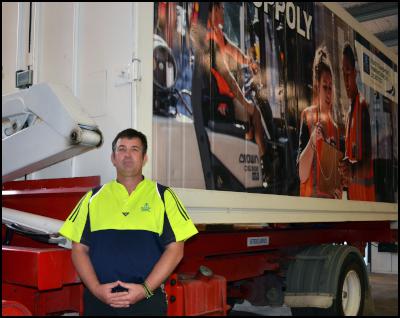Bay Freight Courses Gaining Momentum Throughout the Country
Bay Freight Courses Gaining Momentum Throughout the Country
Bay of Plenty Polytechnic is exporting its freight logistics courses into other regions around the country, due to high demand from industry and training providers.
The Polytechnic’s Commercial Road Transport and Warehousing and Logistics courses are run in partnership with local industry in the Bay of Plenty and are the only ones of their kind in the country. The courses continuously see over 95% of graduates gaining full-time employment.
The course model works in parallel with industry in terms of delivering relevant required skills and addressing shortages – providing safer, more efficient training. As such, demand for the courses is high and the Polytechnic is now offering similar programmes in partnership with Nelson Marlborough Institute of Technology and the Southern Institute of Technology.
Bay of Plenty Polytechnic commercial driving, warehousing and logistics training centre group leader Dean Colville says the success of the programmes all comes down to freight logistics industry involvement and support.
“The whole point of these courses is to give students useable, relevant skills. It isn’t about turning up and getting a qualification. The experienced driving tutors teach in the class and out in the yard, then the students compliment that with real-world driving and loading skills through work experience with the region’s transport and logistics companies.
“They are learning on the job in real life – providing them with valuable practical skills and knowledge.
“To be able to do that, the industry is heavily involved in what we do – from providing work experience opportunities, to providing lease vehicles for training. The reason the courses were established in the first place was because the industry came to us for help in addressing skills shortages in these areas.”
Bay of Connections Freight Logistics Action Group (FLAG) coordinator John Galbraith says the Bay of Plenty industry is getting the collaboration right.
“Freight logistics is an integral part of the Bay of Plenty economy, and collaboration is the key to addressing productivity skills shortages – not just in our region, but further afield as well. The Upper North Island Freight Accord, which was developed in order to improve safety and efficiency of the freight system across Northland, Auckland, Waikato and Bay of Plenty, has five key targets – one of those being to create a future fit freight workforce.
“This means as our economy grows and our workforce ages, New Zealand will need to train, attract and retain enough good people – especially those with freight related skills. Courses such as these go a long way to addressing the identified issues and contribute towards continuous improvement.”
The Bay of Connections Freight Logistics Strategy brings industry within the region together in order to identify and address current and future challenges, such as training and skills. One of the projects of FLAG over the last two years has been to develop some excellent information and promotional material, which it uses to profile the exciting range of careers in logistics at careers events in the Bay.
Mr Colville says taking the training courses into other regions outside the Bay of Plenty means the proven model of training can be adopted and implemented, for the good of the whole industry.

Bay of Plenty Polytechnic
commercial driving, warehousing and logistics training
centre group leader Dean Colville.
“If industry doesn’t back the right sort of programmes, we will have the same shortage problems as we’ve always had. By putting the right people in the right courses with the right companies, we can put a dent in that shortage throughout the country. It’s not a quick fix and it has to be done in the right way, but that is what we’re aiming to do.”
He says the industry has changed dramatically over the past 10 years, with the introduction of more advanced technology.
“Trucks today are basically mobile computer labs. Everything is computerised and drivers need to be smart operators. Technology advances mean the world is getting faster, with all aspects of transport needing to keep pace in terms of being more efficient and effective.
“Career opportunities in the sector have also advanced, with hundreds of different types of positions available in a huge variety of fields.”
The first intake of students in Nelson was in March, with the Southland courses beginning in May.
ENDS


 NZSEG: Powering The Future - NZSE College And Royal New Zealand Navy Forge Educational Partnership
NZSEG: Powering The Future - NZSE College And Royal New Zealand Navy Forge Educational Partnership Courtney Duncan: Illness Prevents Duncan From Contesting First Round Of 2025 World Women’s Motocross Championship
Courtney Duncan: Illness Prevents Duncan From Contesting First Round Of 2025 World Women’s Motocross Championship GPNZ: Extended Skill Mix In Primary Care Teams Improves Patient Access And Outcomes
GPNZ: Extended Skill Mix In Primary Care Teams Improves Patient Access And Outcomes New Zealand Symphony Orchestra: Music Legend To Conduct Bach, Beethoven And Mozart With NZSO
New Zealand Symphony Orchestra: Music Legend To Conduct Bach, Beethoven And Mozart With NZSO Ministry of Health: Ministry Of Health To Look Further At Waikato Hospital Event
Ministry of Health: Ministry Of Health To Look Further At Waikato Hospital Event Emirates Team NZ: Statement From Emirates Team NZ On Auckland Hosting Of 38th America’s Cup
Emirates Team NZ: Statement From Emirates Team NZ On Auckland Hosting Of 38th America’s Cup